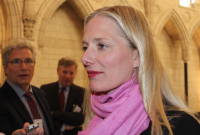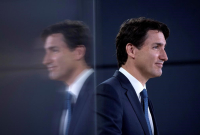Support strong Canadian climate journalism for 2025
Prime Minister Justin Trudeau is looking at a possible trade trip to China early next month but Canada isn't ready to launch formal free trade talks with China just yet.
Canada and China began exploring the idea of a free trade agreement more than a year ago, after Trudeau and Chinese Premier Li Keqiang held back-to-back visits in China and Ottawa.
Three rounds of exploratory talks were held between February and August. Canada also launched consultations on the matter that were completed in June.
"We are in the process of reviewing that and at this time, there has been no decision taken on possible next steps," said Joseph Pickerell, spokesman for International Trade Minister Francois-Philippe Champagne.
But several sources confirmed Trudeau is tentatively planning a trip to China in the first half of December. While Canada isn't ready yet to launch the talks, it's not out of the question that decision could be made before he goes.
At the very least such a trip would make good on the pledge to hold an "annual dialogue" which Trudeau made with Chinese Premier Li Keqiang during his first trip to China last year.
The Trudeau government has said many times expanding the markets for Canadian goods is a priority. China, with its 1.4 billion people, is a lucrative market particularly for Canada's agriculture and natural resources sectors. Trudeau's cabinet even approved the Trans Mountain pipeline expansion last year largely hoping it will improve Canada's ability to get oil to China.
Canada's foreign trade focus in the last year has been largely on the United States and the renegotiations of the North American Free Trade Agreement. However since Keqiang's trip to Ottawa in September 2016, the two countries have been exploring the benefits and drawbacks of a Canada-China free trade agreement.
Canada and China held three rounds of exploratory talks on a free trade deal, two in Beijing and one in Ottawa. The third and final round ended in Beijing in early August. Canada also held consultations last spring with provincial and territorial governments, Canadian businesses and individuals who wanted to weigh in on the pros and cons of such an agreement.
The government has been analyzing the results of both the exploratory talks and the consultations as it decides whether to pursue official talks and while some say the government is close to making a decision, it's not quite there.
The feedback from the consultation process was that there are real opportunities for Canadian businesses but there are also many concerns, such as human rights, labour rights, and intellectual property rights along with China's state-run economy, which might make a traditional free trade agreement more difficult.
Conservative Party leader Andrew Scheer has said he would oppose a Canada-China free trade agreement, fearing China's motives. The Conservatives have been highly critical of the Liberals for allowing Chinese takeovers of Canadian businesses, including approving China’s Hytera Communications acquire Vancouver-based Norsat International Inc.
Public polling has shown mixed results on Canadian attitudes towards China but most polls suggest a plurality of Canadians don't know whether they want to pursue closer trade ties with China or not.
Canada and China also plan to make 2018 the year of Canada-China tourism.





Comments